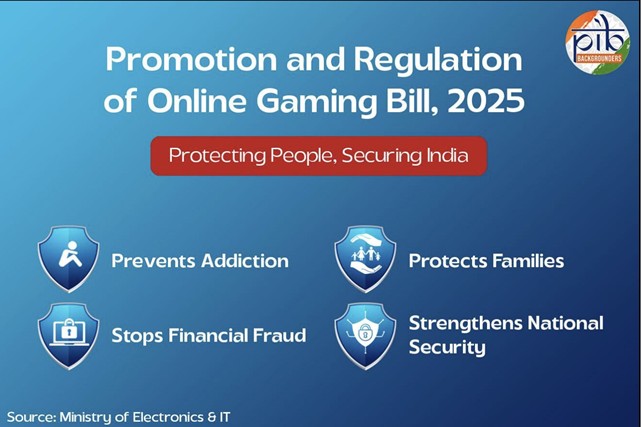The Promotion and Regulation of Online Gaming Act, 2025
September 18, 2025 2025-09-24 6:39The Promotion and Regulation of Online Gaming Act, 2025

The Promotion and Regulation of Online Gaming Act, 2025
by Sneha Singla Sneha is a second year undergraduate student at Lady Shri Ram College, pursuing an honours in Political Science with a minor in Economics.
Introduction and Context
According to WHO, gaming disorder is a health condition marked by loss of control, neglect of daily activities and persistence despite harmful consequences. Online gaming is one of the fastest growing sectors in the digital economy, with diverse segments and notable technological prowess. As per the Mordor Intelligence report (2023), the Indian gaming market was worth
USD 2.2 billion in 2023 and is expected to grow to USD 8.6 billion by 2028. 1
Yet, due the absence of a comprehensive legal framework to guide this growth, unregulated functioning has often resulted in irresponsible activity and harm. According to the Union Minister for Electronics and Information Technology, by mid 2025, 45 crore people are negatively affected by online money games and subsequently, have faced a loss of more than Rs. 20,000 crores. The 59th Report of the Parliamentary Standing Committee on Finance noted that illegal betting applications can pose national security risks, such as using opaque payment routes, misusing the Liberalised Remittance Scheme (LRS), and financing criminal activities.
Different states also have their own legislation. While Telangana banned all online gaming,
Andhra Pradesh banned specifically online gambling. Similarly, Tamil Nadu banned games like Rummy and Poker. Karnataka and Chattisgarh have allowed skill-based gaming but prohibited betting. But the online sphere is universal, and therefore it is important for cohesive and
comprehensive laws to be implemented. This blanket act would therefore allow for better implementation and coordination in efforts to curb illegal activity.
https://www.mordorintelligence.com/industry-reports/india-gaming-market
In this context, the new bill envisages twin functions: firstly, the regulation of safe online social and educational games, including e-sports and secondly, the prohibition of online money games.
Key Features:
The bill addresses the following key issues: fraud, cybercrime, financial loss, mental health and suicides, threat to national security, and addiction.
- Categorisation: Firstly, the bill recognised and classified three kinds of online gaming activity as follows:
| E-Sports | These are organised competitive digital sports where individuals and/or teams compete in a specific framework with pre-defined rules, based on skill (strategic thinking, mental agility, physical dexterity etc.) |
| Online Social Games | Games offered solely for entertainment, recreation or skill-development purposes. These do not include any bets or wagers, and may only involve fee payment for subscription or on-time access. |
| Online Money Games | It is defined as an online game– based on skill, chance, or both– played by a user by paying fees, with expectation of winning monetary and other benefits in return of stakes. |
- Online gaming authority: An central online gaming authority shall be set up, or an existing agency may be appointed to oversee the implementation of the Act. It will set up guidelines, categorise games, and address public grievances. The appointment, salary and disqualification of the members of such a committee shall be under the purview of the central government.
- Development of E-sports: The said agency would be responsible for formulating rules and guidelines with regards to E-sports. At the same time, training academies, research centres and other such institutions under the purview of the Ministry for Youth Affairs and Sports. Thereby, e-sports shall be integrated into the larger sports policy framework.
- Promotion of online social games: They shall also be promoted by ensuring age-appropriate content and increasing awareness. Further, it envisions a mechanism for proper registration of these games. Lastly, programmes are to be created for encouraging both educational and recreational content.
- Prohibition of money games: Games involving online wagering, bets or other financial impetus shall be strictly banned. As a result, no persons, media, or financial institutions must aid or abet such games. In case they do so, they must face penalties (including imprisonment upto 2 years and/or fine upto 50 lakh rupees). The companies offering such services face even greater penalties (imprisonment upto 3 years and/or fine upto 1 crore rupees)
Key Challenges:
There has been some significant opposition posed to this bill, specifically by the corporates and financiers working in online money games. Notably, this industry has gained immense traction over the past few years and involves great financial investment. It is argued that like e-sports and social games, money games should also be regulated, not absolutely banned. This is backed by multiple reasons: firstly, a blanket ban would lead to unemployment and loss of taxes for the government.
Further, it may lead to even greater security risks since many users would transition to illegal and underground gaming websites. This would increase vulnerability to scams, especially through foreign outlets. Illegal offshore gaming would increase, thereby increasing risk of money laundering and fraud. At the same time, another section of critics argue that this falls under the state list of subjects, therefore the union government does not possess the right to legislate upon it. These arguments would perhaps also be the greatest challenge for the government moving forward: curbing the illegal alternatives.
Recommendations:
In order to secure its goals, the government must therefore, strengthen its monitoring channels. This is in regards not only to this particular bill, but is also crucial to combat the risk of cyber security associated with increasing digital growth. For this, skilled IT professionals and experts can work in tandem with the government in the form of university tie-ups or private-public partnerships. India’s growing AI industry can be integrated and given impetus to develop mechanisms for dealing with cyber crime and fraud.
Simultaneously, the implementation of this bill must ensure careful coordination with state governments, by establishing state level authorities under the new designated authority. This would mitigate legal hurdles with regards to any federal overstepping. At the same time, an amicable pathway would be created at the ground level: the skills and resources of states will be leveraged, in partnership with the centre, to promote e-sports and prevent online money games. This partnership and coordination is furthermore important for ensuring timely and organised registration of gaming companies, and well-equipped training mechanisms (for e-sports).
Conclusion
The 2025 Act is a key milestone in India’s digital journey. The policy aims to segregate the empowering from the exploitative, in order to ensure safe and sustainable digital practices. For this, a categorisation has been created of e-sports, online social games and online money games, of which the third is subject to a blanket ban. This ban has been a subject of controversy and debate, yet it may also be seen as a harsh, but imperative solution to growing problems of fraud, addiction, mental health and so on. This policy is ambitious, but it requires careful leveraging of resources in order to ensure that it is implemented without leaving loopholes.
Sources
- https://prsindia.org/files/bills_acts/bills_parliament/2025/Bill_Text-Online_Gaming_Bill_202 5.pdf
- https://static.pib.gov.in/WriteReadData/specificdocs/documents/2025/aug/doc202582161810 1.pdf
- https://blog.mygov.in/editorial/promotion-and-regulation-of-online-gaming-bill-2025/
- https://www.meity.gov.in/documents/act-and-policies/promotion-and-regulation-of-online-ga ming-act-2025-and-its-corrigenda-kTMxQjMtQWa






